
Video on improving mental health by using this acronym.
- Subject:
- Psychology
- Material Type:
- Lecture
- Author:
- Rhonelee Soria
- Date Added:
- 01/29/2021

Video on improving mental health by using this acronym.
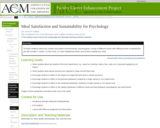
To teach students about the content and impact (environmental, psychological, social) of different meals with differing levels of satisfaction, we will consider 3 meals: 1) Fast Food; 2) Least Satisfactory Meal; and 3) More satisfactory meal.
(Note: this resource was added to OER Commons as part of a batch upload of over 2,200 records. If you notice an issue with the quality of the metadata, please let us know by using the 'report' button and we will flag it for consideration.)

In this course students create digital visual images and analyze designs from historical and theoretical perspectives with an emphasis on art and design, examining visual experience in broad terms, and from the perspectives of both creators and viewers. The course addresses key topics such as: image making as a cognitive and perceptual practice, the production of visual significance and meaning, and the role of technology in creating and understanding digitally produced images. Students will be given design problems growing out of their reading and present solutions using technologies such as the Adobe Creative Suite and/or similar applications.

This is a 6 minute video lesson about memorizing the parts of the brain using your hands. It was created for a Psychology class and focuses on learning about where each major part of the brain is located. It's based off of the work found here: http://www.pbs.org/wgbh/nova/coma/geography/photos.html.
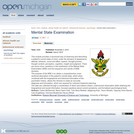
This module provides a structured way of observing and describing a patient's current state of mind, under the domains of appearance, attitude, behavior, mood and affect, speech, thought process, thought content, perception, cognition, insight and judgment. There are some minor variations in the subdivision of the Mental State Examination (MSE) and the sequence and names of MSE domains.

This presentation provides an overview of the important aspects of military psychology, highlighting the crucial role these professionals play in supporting the mental health and well-being of military personnel.

Cognitive science arose in the 1950s when it became apparent that a number of disciplines, including psychology, computer science, linguistics, and philosophy, were fragmenting. Perhaps owing to the field’s immediate origins in cybernetics, as well as to the foundational assumption that cognition is information processing, cognitive science initially seemed more unified than psychology. However, as a result of differing interpretations of the foundational assumption and dramatically divergent views of the meaning of the term information processing, three separate schools emerged: classical cognitive science, connectionist cognitive science, and embodied cognitive science.
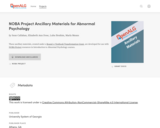
These ancillary materials, created under a Round 15 Textbook Transformation Grant, are developed for use with NOBA Project resources in Introduction to Abnormal Psychology courses.
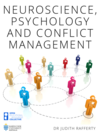
This peer reviewed eBook introduces readers to foundational concepts in neuroscience, cognitive psychology, personality psychology and social psychology to help explain why conflict occurs, how it develops and how it may be managed and/or resolved.
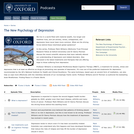
We live in a world filled with material wealth, live longer and healthier lives, and yet anxiety, stress, unhappiness, and depression have never been more common. What are the driving forces behind these interlinked global epidemics? In this series, Professor Mark Williams (Wellcome Trust Principal Research Fellow at Oxford University) and Dr Danny Penman discuss the recent scientific advances that have radically altered our understanding of depression and related disorders. Also discussed is the latest treatments and therapies that are offering hope to those suffering from depression. Professor Williams co-developed Mindfulness-Based Cognitive Therapy (MBCT), a treatment for anxiety, stress and depression that is at least as effective as drugs at preventing new episodes of depression. It's now one of the preferred treatments for depression recommended by the UK's National Institute for Health and Clinical Excellence. The same technique, based upon an ancient form of meditation, can also help us cope more effectively with the relentless demands of our increasingly frantic world.
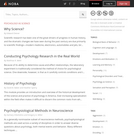
Noba is a high-quality, flexibly structured digital introduction to psychology resource for higher-ed classrooms and virtual classrooms. Noba consists of nearly 90 short (2500-4000 word) chapters authored by leading instructors and researchers including 7 winners of the William James Award. Chapters are organized in familiar categories (Development, Learning & Memory, Personality, etc.) for easy reference. All Noba materials are licensed through Creative Commons under the CC BY-NA-SA license terms.
The Noba website allows anyone to combine chapters in any order to create unique psychology textbooks to suit virtually any curriculum. In addition to allowing users to build their own customized collections, Noba provides a series of "Ready-Made" digital textbooks curated from the Noba chapters to conform to the scope and sequence of some of the most commonly taught 100/200-level psych courses (Intro-to-Psych, Psych as a Biological Science, Psych as a Social Science, etc.). The Ready-made books can also be edited to add or remove chapters, or sections so that they better conform to the specific course an instructor will teach.
Custom-made books, Ready-made books, or even individual chapters can be used online, downloaded as PDFs or shared withe learners via email and social media using easy-share tools built in to the website.

This is a worksheet to accompany a hands-on class experience with sensation for a Psychology 101 class. It focuses on observation of sensations and a natural setting.

This chapter we will be acknowledging and bringing awareness to the historical discrimination that has barred education and research access to those in the Psychological field due to color, gender and other racial biases. Only by understanding this prejudice and racial discrimination can we discover the root causes of inequity and recognize those in the field that had a direct and positive contribution to the development of the field of Psychology.
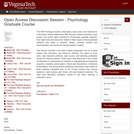
This OER Package includes a description, lesson plan, and materials for a discussion session addressing: Why are open research practices, open access, and author rights important to Psychology graduate students? How might tools and resources related to these impact choices graduate students may make in research design, research practice and documentation, and venues for sharing research results?
This session included a pre-class reading assignment and an in-class session with discussion and hands-on activities. The topics of focus were: open research practices, open access, and selecting publication venues for sharing research. These topics were discussed in the context of authorship as experienced by students in undergraduate and graduate programs, including course papers, theses and dissertations, conference presentations, and journal article publishing. Discussions were based on three readings completed prior to the in-class session that covered aspects of: open access, peer review, and open research practices. The class also discussed evaluation criteria to use when selecting a publication venue.
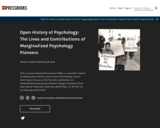
Short Description:
This is an open educational resource (OER) co-created by students in undergraduate History and Systems of Psychology courses. Each chapter focuses on the life and contributions of a marginalized pioneering psychologist. [Image Attribution: Penn State Special Collection, https://goo.gl/WP7Dgc, CC BY-NC-SA 2.0, https://goo.gl/Toc0ZF]
Long Description:
Understanding the history of a discipline requires looking at prominent figures and events that contributed to the growth of the discipline. Yet historical accounts are prone to including what those writing the accounts believe is most important to know. Within the discipline of psychology, women and people of color are noticeably absent from historical accounts, particularly those in traditional textbooks (Cramblet Alvarez et al., 2020).
This collection of chapters features the lives and contributions of pioneering women and psychologists of color–including their general biographies, important achievements, the historical context surrounding their work, and the historical impact their work has left on the field of psychology.
Each chapter was written by students in sections of History and Systems of Psychology courses at the University of North Dakota and the University of Nevada Reno, under the direction of their course instructors, Dr. Alison Kelly (UND) and Dr. Brittany Avila (UNR). Students worked in teams through multiple drafts of their chapters throughout the semester and were able to choose to publish their work as part of this compilation.
Word Count: 59343
(Note: This resource's metadata has been created automatically by reformatting and/or combining the information that the author initially provided as part of a bulk import process.)
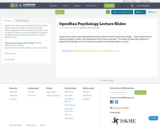
These lecture slides were developed by Patricia Adams of Pitt Community College. They include lecture outlines, graphics, tables, and summaries of the course concepts. The slides are generally aligned to OpenStax Psychology, but the materials is specific to Professor Adams's course.
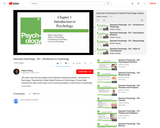
Openstax Psychology for General Psychology classes. Presented by Dr. Mark Hatala, Professor of Psychology at Truman State University, these videos cover topics from the Openstax textbook for Psychology chapter by chapter.

Students will identify and recall the social institutions of schooling and education in American society, and analyze how the different methods of schooling transmit the values of society in the most effective way.

The goal of this doctoral course is to familiarize students with major conceptual frameworks, debates, and developments in contemporary organization theory. This is an inter-disciplinary domain of inquiry drawing primarily from sociology, and secondarily from economics, psychology, anthropology, and political science. The course focuses on inter-organizational processes, and also addresses the economic, institutional and cultural contexts that organizations must face.
This is an introduction to a vast and multifaceted domain of inquiry. Due to time limitations, this course will touch lightly on many important topics, and neglect others entirely; its design resembles more a map than an encyclopedia. Also, given the focus on theoretical matters, methodological issues will move to the background. Empirical material will be used to illustrate how knowledge is produced from a particular standpoint and trying to answer particular questions, leaving the bulk of the discussion on quantitative and qualitative procedures to seminars such as 15.347, 15.348, and the like.

This resource is a course map that aligns with Psychology 2e and includes module level outcomes and suggested activities/resources/assignments. The course map was authored by four faculty from three different community colleges in Arizona including, Central Arizona College, Eastern Arizona College, and Yavapai College.